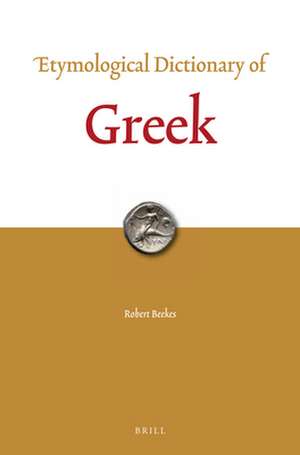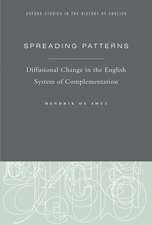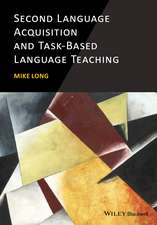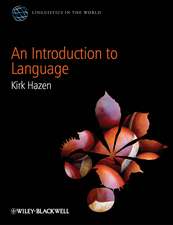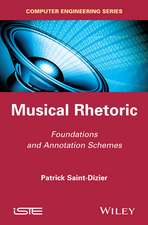Etymological Dictionary of Greek (2 vols.)
Autor Robert Beekesen Limba Engleză Paperback – iun 2016
The first comprehensive etymological dictionary of Greek in the English language
Greek is among the most intensely and widely studied languages known. Since the publication of the last etymological dictionary of Greek, both the reconstruction of Proto-Indo-European, and our knowledge of the Greek substrate have led to numerous, often surprising new insights into the history and formation of the Greek vocabulary.
This dictionary is a treasure trove covering 2000 years of Ancient Greek: from Mycenaean via Homer and the classical period to lexicographers, such as Hesychius (5th century A.D.).
It consists of 7500 entries with thoroughly revised etymologies. Each entry gives clear information about the origin of the Greek word and its first date of attestation. It further provides all etymologically relevant variants, dialectal forms, derivatives, compounds, and bibliographical references.
This dictionary is a truly indispensable tool for those in search of a deeper knowledge of the Greek vocabulary, its history and, therewith, a better understanding of the language.
Preț: 845.82 lei
Preț vechi: 1031.49 lei
-18% Nou
Puncte Express: 1269
Preț estimativ în valută:
161.88€ • 168.55$ • 136.80£
161.88€ • 168.55$ • 136.80£
Carte disponibilă
Livrare economică 17 februarie-03 martie
Preluare comenzi: 021 569.72.76
Specificații
ISBN-13: 9789004321861
ISBN-10: 9004321861
Dimensiuni: 155 x 235 x 101 mm
Greutate: 2.74 kg
Editura: Brill
Colecția Brill
ISBN-10: 9004321861
Dimensiuni: 155 x 235 x 101 mm
Greutate: 2.74 kg
Editura: Brill
Colecția Brill
Notă biografică
Robert S. P. Beekes (Ph.D. 1969) is Professor emeritus of Comparative Indo- European Linguistics at Leiden University. He has published extensively on the historical grammar of Greek, Iranian and Indo-European, including The Development of the Proto-Indo-European Laryngeals in Greek (Mouton, 1969), The Origins of the Indo-European Nominal Inflection (IBS, 1985), A Grammar of Gatha-Avestan (Brill, 1988), and Comparative Indo-European Linguistics: An Introduction (Benjamins, 1995).
Recenzii
A must-have research tool that should be on every classicist’s desk.
Greek is among the most intensely and widely studied languages known. Since the publication of the last etymological dictionary of Greek, both the reconstruction of Proto-Indo-European, and our knowledge of the Greek substrate have led to numerous, often surprising new insights into the history and formation of the Greek vocabulary.
This dictionary is a treasure trove covering 2000 years of Ancient Greek: from Mycenaean via Homer and the classical period to lexicographers, such as Hesychius (5th century A.D.).
It consists of 7500 entries with thoroughly revised etymologies. Each entry gives clear information about the origin of the Greek word and its first date of attestation. It further provides all etymologically relevant variants, dialectal forms, derivatives, compounds, and bibliographical references.
This dictionary is a truly indispensable tool for those in search of a deeper knowledge of the Greek vocabulary, its history and, therewith, a better understanding of the language.
Greek is among the most intensely and widely studied languages known. Since the publication of the last etymological dictionary of Greek, both the reconstruction of Proto-Indo-European, and our knowledge of the Greek substrate have led to numerous, often surprising new insights into the history and formation of the Greek vocabulary.
This dictionary is a treasure trove covering 2000 years of Ancient Greek: from Mycenaean via Homer and the classical period to lexicographers, such as Hesychius (5th century A.D.).
It consists of 7500 entries with thoroughly revised etymologies. Each entry gives clear information about the origin of the Greek word and its first date of attestation. It further provides all etymologically relevant variants, dialectal forms, derivatives, compounds, and bibliographical references.
This dictionary is a truly indispensable tool for those in search of a deeper knowledge of the Greek vocabulary, its history and, therewith, a better understanding of the language.
